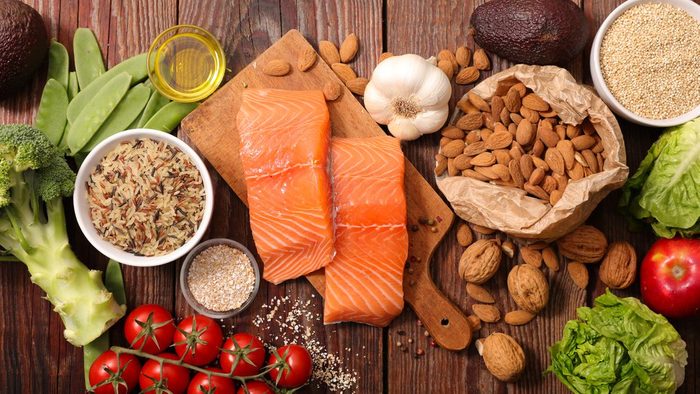
The rules of an anti-inflammatory diet
What exactly is an anti-inflammatory diet? “It involves choosing whole, mostly plant-based foods like fruits and vegetables, nuts and seeds, whole grains, olive oil, and fatty fish,” says Samantha Cassetty, MS, RD, a nutritionist in New York City. She adds that it’s just as important to cut back on certain foods. Those eats include refined grains like white bread, sugary drinks and snacks, and processed meats.
“Research suggests that inflammation can be triggered by chronic stress, which can lead to heart disease, cancer, diabetes, depression, and Alzheimer’s,” says Maria Kinirons, RD, a dietitian in Dix Hills, New York. “Also, obesity has been linked as both a cause and the result of inflammation.” Keep in mind that the anti-inflammatory diet is a lifestyle, not a short-term solution.
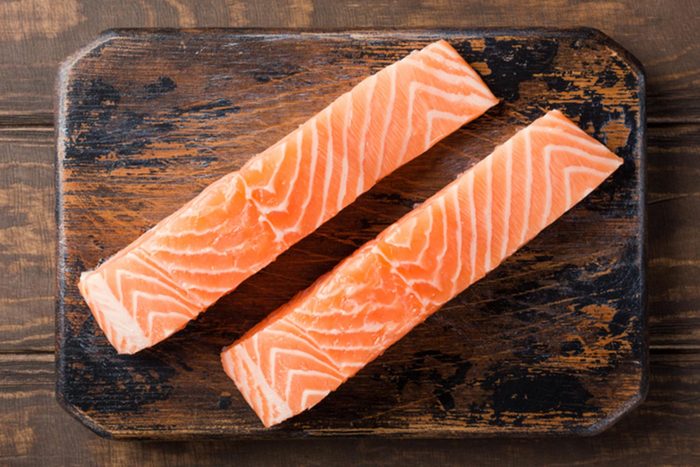
Eat wild salmon
Along with other fatty fish, wild salmon boasts omega-3 fatty acids. “While you can get omega-3s from walnuts, flax, and other foods, the form in fish is much more bioavailable,” says Cassetty. What’s more, the omega-3s in fish have been found to lower inflammation and help protect your heart and brain. “Americans tend to under-consume omega-3s and overconsume omega-6s, found largely in certain vegetable oils,” says Cassetty. “The problem with this is that omega-6s are pro-inflammatory, so it’s really important to eat foods with omega-3s to shift this balance.” These foods can also help reduce joint pain.
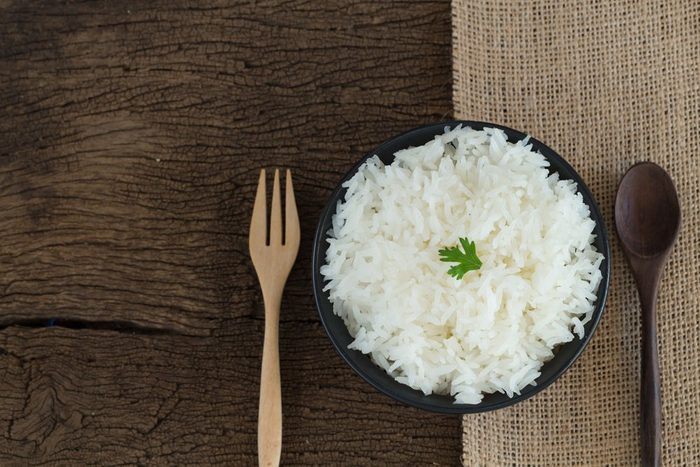
Limit white rice
“Compared to whole-grain rice, this takeout favorite causes blood sugar to spike more quickly,” says Therese Bonanni, MS, RDN, a nutritionist at Navesink Wellness Center in Rumson, New Jersey. “This can activate pro-inflammatory compounds known as cytokines.” So opt for brown or wild rice in your anti-inflammatory diet when you can. “Limiting refined grains helps decrease the inflammatory process by reducing the body’s insulin response, fanning the flames that may contribute to external reactions like eczema or psoriasis,” Bonanni adds. Did you know yoga is good for digestion, too.
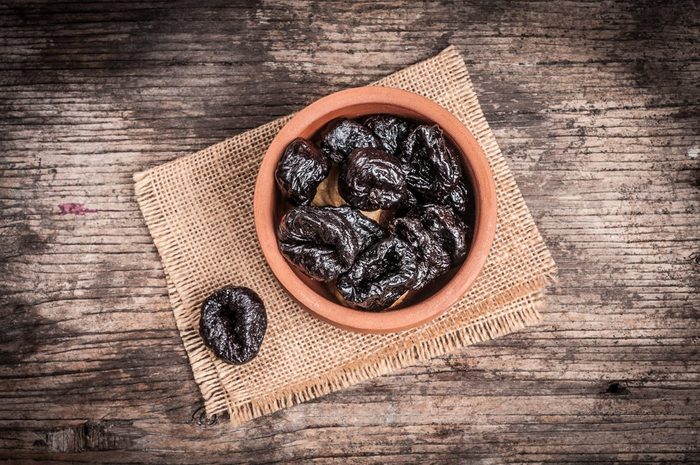
Eat prunes
These purple gems have a lot going for them in the world of nutrition: “Research finds that regularly eating prunes can help support good digestive health and healthy bones,” says Jackie Newgent, RDN, a culinary nutritionist in Brooklyn, New York, and spokesperson for California Prunes. “Their beneficial effects on bones are due in part to their polyphenols, which may have potential anti-inflammatory properties.” Prunes offer fiber, too. “Research finds that fiber has a strong anti-inflammatory effect,” Newgent adds.

Limit baked goods
“Pastries typically have a triple whammy because they’re loaded with sugar, refined flour, and unhealthy fats—all of which increase inflammation,” say the Nutrition Twins Lyssie Lakatos, RDN, CFT, and Tammy Lakatos Shames, RDN, CFT, dietitians in New York City and creators of the Nutrition Twins 21-Day Body Reboot. “Too much sugar can alert the body to create inflammation.”
One of the biggest baked-good offenders? Traditional cinnamon rolls. “One of the many, many reasons why I don’t recommend these aromatic, bakery-style rolls is that they’re basically like dessert on steroids,” Newgent notes. “One of the most popular food-court varieties provides a whopping 58 grams of sugar and 17 grams of saturated fat.” Gwyneth Paltrow has recommended this anti-inflammation remedy – but it actually resulted in another celeb being hospitalized!
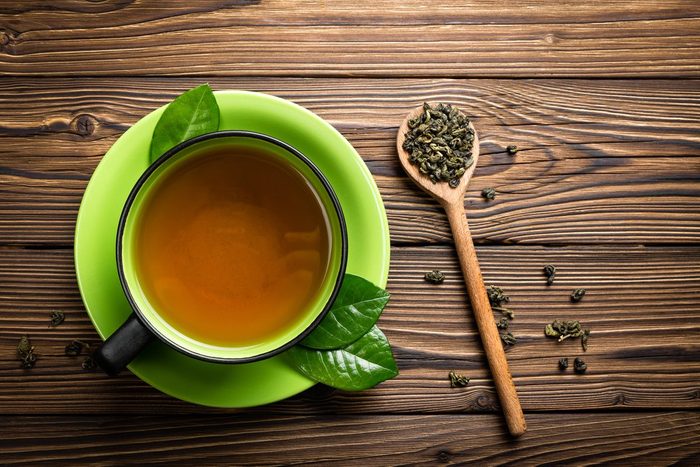
Drink green tea
This soothing beverage is filled with antioxidants that can do so much for your health, so it’s a great addition to any anti-inflammatory diet. Green tea is tied to a lower risk of heart disease, Alzheimer’s disease, and even cavities. “According to the Dietary Inflammatory Index, green tea has an overall anti-inflammatory effect with a score of -0.56,” says Kinirons. “Foods that are anti-inflammatory have a negative score below zero, while those that are pro-inflammatory have a positive score above zero.”
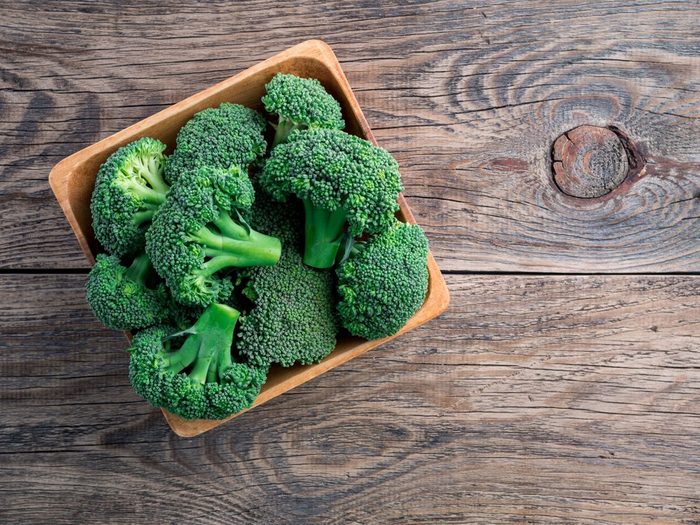
Eat broccoli
“Cruciferous vegetables like broccoli top my list of anti-inflammatory foods,” says Marisa Moore, RDN, a dietitian in Atlanta, Georgia. “Broccoli contains sulforaphane, a phytochemical that may have cancer-fighting properties as well as anti-inflammatory effects to ward off chronic inflammation.” Cruciferous vegetables are rich in sulfur and go through two detox phases in the liver, forcing the body to create more enzymes that help reduce inflammation, the Nutrition Twins note. Eat broccoli roasted or sautéed, or shred it into a salad.

Skip the double cheeseburgers
Reducing saturated-fat intake is connected with a decreased risk of heart disease, so consider that a typical double cheeseburger with mayo contains 23 grams of this dangerous substance. “Saturated fat has been shown to increase inflammatory responses,” says Kinirons. “In the Dietary Inflammatory Index, it has a score of 0.37.” Limit your daily saturated-fat intake to no more than 10 percent of your daily calories. So for a 2,000-calorie daily diet, that means no more than 22 grams of saturated fat.
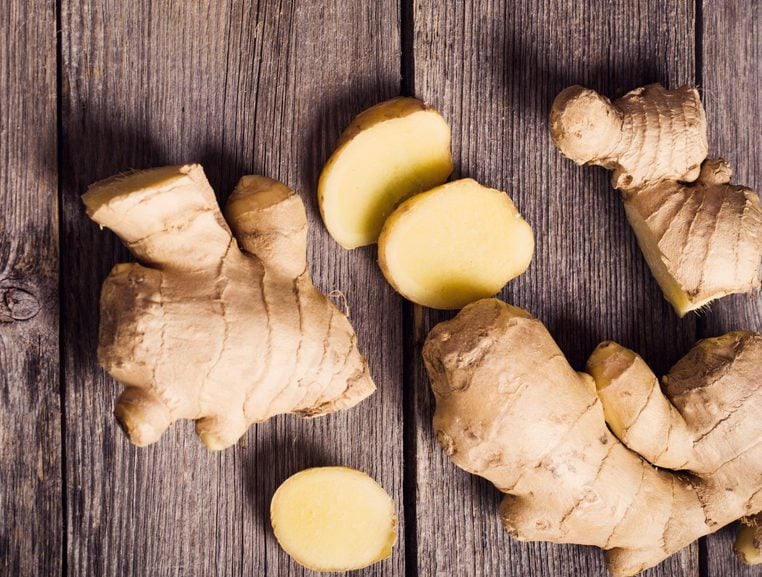
Eat ginger
Ginger does a whole lot more than flavor your food: It’s a very helpful addition to an anti-inflammatory diet. “This health-promoting food [has] a significant anti-inflammatory effect,” says Newgent. “For instance, ginger may play a role in turning off select inflammatory genes, which could explain its potential pain-relieving benefit.” She explains that many of ginger’s beneficial properties may be due to anti-inflammatory compounds found only in ginger: shogaols and gingerols.
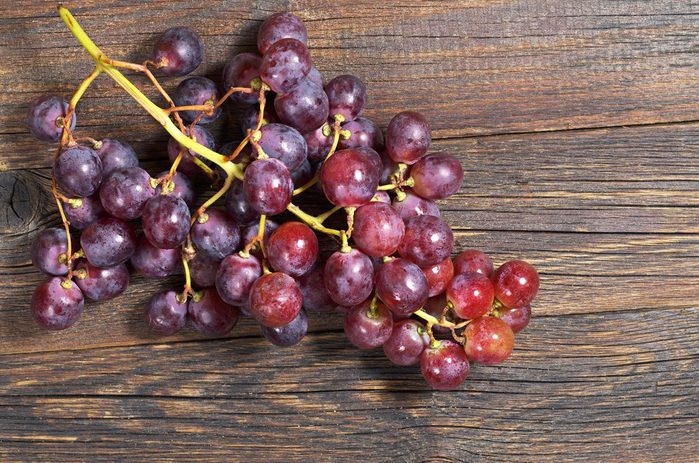
Eat grapes
Add the fruit to a morning smoothie or parfait, or freeze the seedless version for a healthy dessert in your anti-inflammatory diet plan. “A number of studies have found that grapes may help inhibit inflammation,” says Toby Amidor, MS, RD, a dietitian in New York City and a nutrition partner with Grapes from California. “And polyphenols, found in grapes, are linked with decreased inflammation.” The red, black, and green varieties are all equally good for you!

Limit alcohol
Yes, there is a suggested limit to daily alcohol intake: “The 2015-2020 Dietary Guidelines for Americans recommends that if you choose to drink, do so in moderation,” says Amidor. “This is defined as a maximum of one drink per day for women and two drinks per day for men.” And here’s how you should define a drink: 12 fluid ounces of beer, 5 fluid ounces of wine, or 1.5 fluid ounces of 80-proof liquor like vodka or rum. “Drinking too much alcohol has been shown to cause inflammation—especially of the liver, which helps metabolize alcohol,” says Amidor. “If you like to drink a few drinks regularly after work or over the weekend, you may want to cut back.”
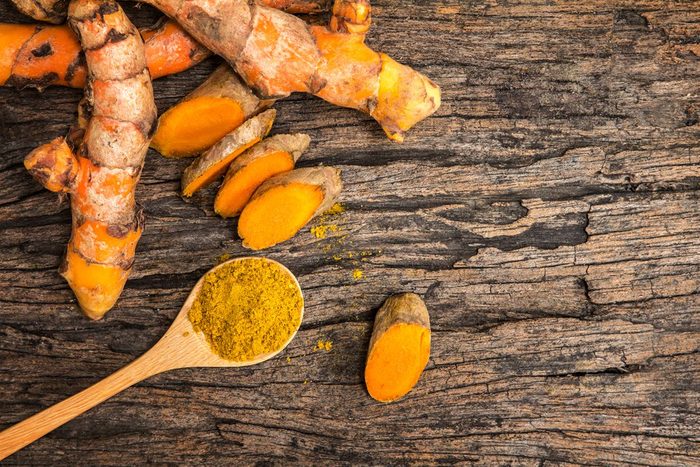
Eat turmeric
You can add this anti-inflammatory plant to everything from smoothies to stir-fries and soups. “It contains very potent anti-inflammatory compounds and has been studied specifically in relation to arthritis benefits,” says Alicia Blittner, MS, RDN, a corporate nutritionist and employee wellness manager at FreshDirect in New York City. Check out these other incredible benefits of turmeric.

Skip soda
“Regular soda is filled with added sugar,” says Amidor. In a study published in the American Journal of Clinical Nutrition, about 1,500 women were followed for more than a decade. Researchers discovered that women who ate more refined sugars or starches, less bread and cereal, and fewer vegetables were at a greater risk for diseases linked to inflammation, like heart disease, says Amidor.
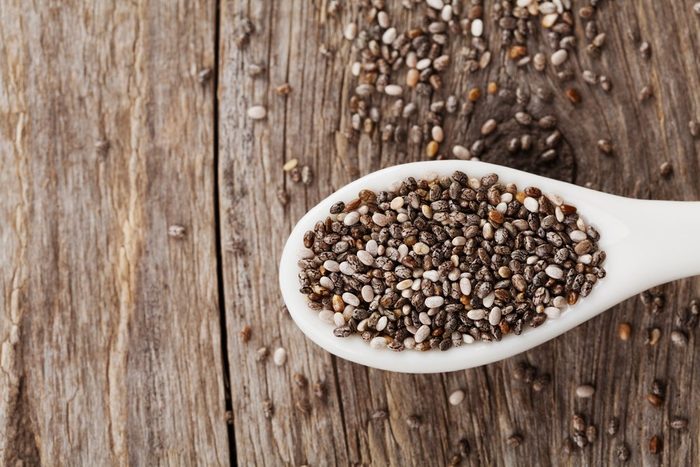
Eat chia seeds
These little seeds are not only great for chia pudding but also make a tasty crunchy mix-in for smoothie bowls and energy bites included in your anti-inflammatory diet. “Chia seeds are known for their antioxidant properties, along with being an excellent source of inflammation-squashing omega-3 fatty acids—as well as protein and dietary fiber,” says Dana Angelo White, MS, RD, author of the Healthy Instant Pot Cookbook and nutrition partner with Bob’s Red Mill.
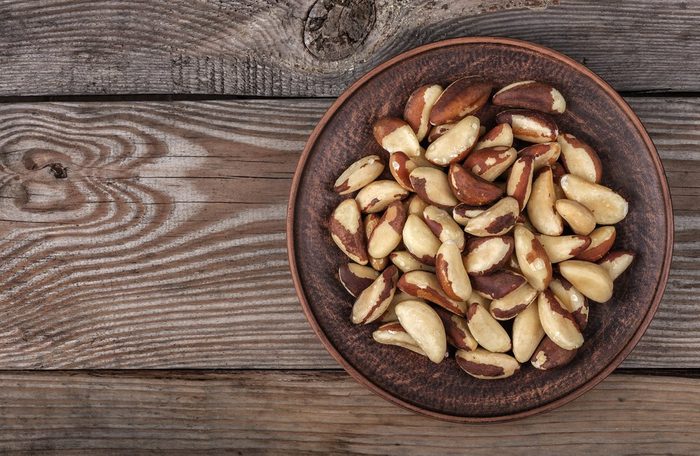
Eat Brazil nuts
Here’s another tasty food you can add to your anti-inflammatory diet. “Often left at the bottom of the mixed-nuts bag, Brazil nuts are a natural source of selenium, a nutrient that helps your immune system function at its best,” Bonanni says. “Supplements are often unregulated, so it’s best to get selenium from whole-food sources.” Next, learn about sneaky foods that can raise your blood sugar.
